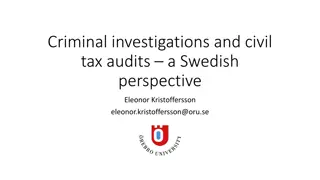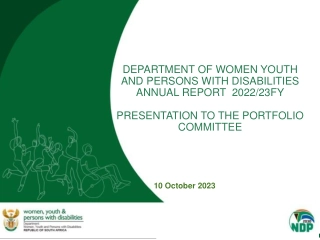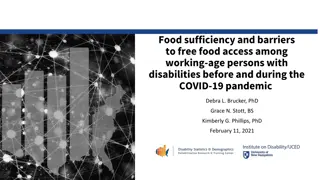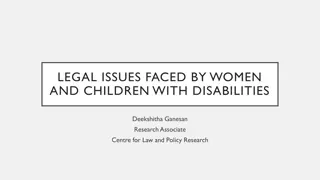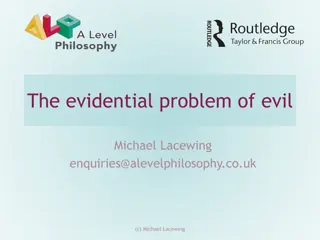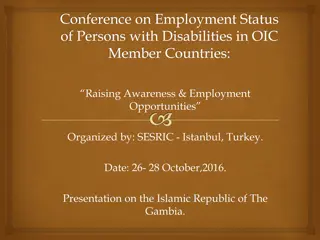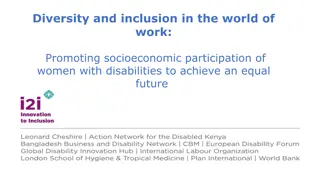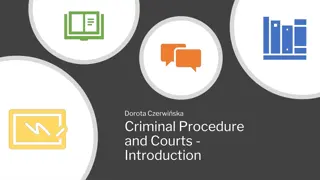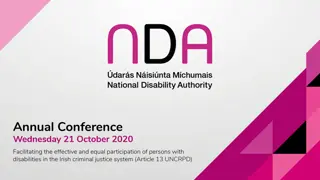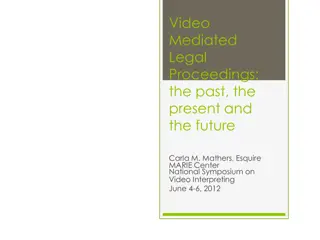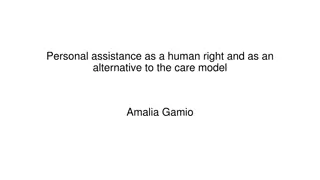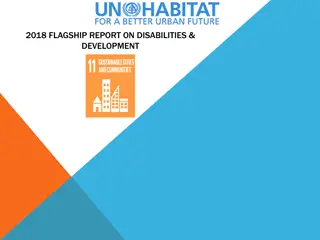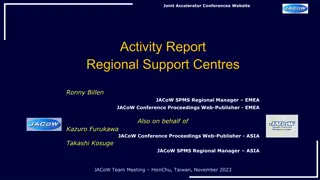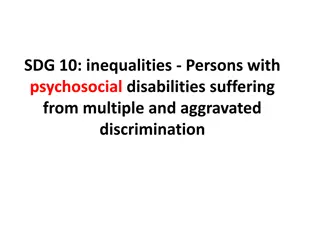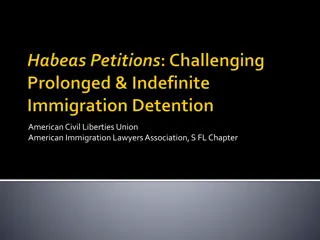Evidential Barriers Faced by Persons with Disabilities in Criminal Proceedings - NDA Annual Conference 2020
Understanding the challenges faced by individuals with disabilities in criminal proceedings, this presentation at the NDA Annual Conference 2020 delves into Ireland's legal landscape, including special measures under the Criminal Evidence Act 1992 and key barriers to obtaining best evidence. Dr. Alan Cusack from the University of Limerick explores the disjointed statutory framework, limited accommodations, and professional practice issues contributing to these challenges.
Download Presentation

Please find below an Image/Link to download the presentation.
The content on the website is provided AS IS for your information and personal use only. It may not be sold, licensed, or shared on other websites without obtaining consent from the author. Download presentation by click this link. If you encounter any issues during the download, it is possible that the publisher has removed the file from their server.
E N D
Presentation Transcript
Evidential Barriers faced by Persons with Disabilities in Criminal Proceedings NDA Annual Conference 2020 21 October 2020 Dr. Alan Cusack Lecturer in Law, University of Limerick
Overview PART I: Understanding Ireland s Special Measures Landscape Criminal Evidence Act 1992 Criminal Law (Sexual Offences) Act 2017 Criminal Justice (Victims of Crime) Act 2017 PART II: Outstanding Barriers to Best Evidence The Disjointed Statutory Landscape The Limited Range and Availability of Accommodations. Poor Professional Practice
PART I Understanding Ireland s Special Measures Landscape
Criminal Evidence Act 1992 Any special legislative arrangements facilitating the giving of evidence by children by the use of closed circuit television, video recordings and skilled examiners should also apply in cases of sexual offences against persons suffering from a mental handicap or suffering from mental illness - Law Reform Commission (1990: 587). Criminal Evidence Act 1992: placed special measures on a statutory footing in Ireland for the first time. Eligiblity: (i) children; (ii) persons with a mentalhandicap .
Criminal Evidence Act 1992 (2) Special Measures under Criminal Evidence Act 1992 Special Measures Ireland England & Wales Television Link Evidence s.13, CE Act 1992 s. 24, YJCE Act 1999 Use of Intermediary s.14(1), CE Act 1992 s.29, YJCE Act 1999 Pre-recorded Evidence-in-Chief s.16(1), CE Act 1992 s.27, YJCE Act 1999 Removal of Wigs & Gowns s.13(1), CE Act 1992 s.26, YJCE Act 1999 Delivery of Unsworn Testimony s.27(3), CE Act 1992 s.56, YJCEA Act 1999
Criminal Evidence Act 1992 (3) Grounds for Criticism A. Strict Eligibility Criteria: Apart from s.16(1) of 1992 Act, measures were unavailable to defendants. Eligibility for measures limited to cases involving a sexual and/or violent offence. Home Office: a witness was either vulnerable or s/he was not and...the offence was relevant to the extent to which it helped to inform the assessment of vulnerability (Speaking Up for Justice, 1998).
Criminal Evidence Act 1992 (4) Grounds for Criticism B. Child-Focused Support: Legislation was designed to respond to the testimonial needs of children, not those of intellectually disabled witnesses. Edwards et al. (2012): Many of these measures were first introduced to assist children as witnesses, and whilst there has been growing recognition of people with disabilities as vulnerable witnesses, it is still the case that there has been considerably more emphasis (and indeed research) on special measures as they apply to children .
Criminal Law (Sexual Offences) Act 2017 (1) Introduced amendments aimed at rendering the justice system less formal and more sensitive for child victims of sexual abuse Explanatory Memorandum (2015): Restrictions on Personal Cross-Examination: s.14C, Criminal Evidence Act 1992 Screens: s.14A, Criminal Evidence Act 1992 Expanded Pre-recorded Evidence in Chief: s.16(1)(b), Criminal Evidence Act 1992 Screens and expanded pre-recorded evidence-in-chief were repealed before being commenced (Criminal Justice (Victims of Crime) Act 2017.
Criminal Law (Sexual Offences) Act 2017 (2) Introduced amendments aimed at rendering the justice system less formal and more sensitive for child victims of sexual abuse Explanatory Memorandum (2015): Restrictions on Personal Cross-Examination: s.14C, Criminal Evidence Act 1992 Screens: s.14A, Criminal Evidence Act 1992 Expanded Pre-recorded Evidence in Chief: s.16(1)(b), Criminal Evidence Act 1992 Screens and expanded pre-recorded evidence-in-chief were repealed before being commenced (Criminal Justice (Victims of Crime) Act 2017.
Criminal Law (Sexual Offences) Act 2017 (3) Grounds for Criticism Only child witnesses to a sexual/violent offence are presumed to be entitled to protection does not include adult witnesses with an intellectual disability. Limited to adultvictims of a sexual offence without benefit of a presumption. No residual discretion to order the measure (contrast: E&W s.36 YJCEA).
Criminal Justice (Victims of Crime) Act 2017 An Act to give effect to provisions of Directive 2012/29/EU of the European Parliament and of the Council of 25 October 2012 Premable, 2017 Act. Established a significant battery of servicerights for victims in Ireland: Service Rights: Right to Information from An Garda S och na s.7, 2017 Act. Right to Request Reasons for Decision not to Prosecute s.8, 2017 Act. Right to Sentencing, Detention and Release Details s.8, 2017 Act. Right to Accompaniment for Child Victims s.18, 2017 Act.
Criminal Justice (Victims of Crime) Act 2017 (cont.) Procedural Rights: Revised Traditional Categories under 1992 Act: Replaced mentalhandicap with mentaldisorder s.19, 1992 Act. New Eligibility: (i) children; (ii) persons with a mentaldisorder . Revised Special Measures: (i) screens, (ii) wigs (iii) pre-recorded evidence- in-chief. New Categories under 2017 Act: New category: Victims with special protection needs s.19, 2017 Act. Special Measures: (i) TV Link Testimony, (ii) Intermediaries (iii) Screens s.19, 2017 Act.
Part II Outstanding Barriers to Best Evidence
Criminal Justice (Victims of Crime) Act 2017 (1) A. Disjointed Statutory Landscape A special measures package should be created for vulnerable witnesses - as distinct from a range of ad hoc measures that can be applied inter alia to vulnerable witnesses- to ensure a more inclusionary approach to the reception of such witnesses' testimony ICCL (2013: 225) Amendments have created a legallabyrinth (Heffernan, 2019): Risk that the availability of special measures will be misunderstood. Heightened risk of appeal applications following conviction. Witnesses with intellectual disabilities no longer enjoy benefits afforded to children.
Criminal Justice (Victims of Crime) Act 2017 (2) Special Measure Prejudicial Effect Legislation TV Link Testimony Removal of Presumption. s.13, CE Act 1992 Protection From Personal Cross-Examination No presumption for adult witnesses with mental disorder . Only open to adult victims of a sexual offence (without presumption). s.14C, CE Act 1992 Screens No entitlement for adult witnesses with mental disorder . Only open to victims and/or child witnesses to sexual/violent offences. s.14A, CE Act 1992
Criminal Justice (Victims of Crime) Act 2017 (3) Criminal Justice (Victims of Crime) Act 2017 (3) B. Limited Range & Availability of Accommodations No provision for pre-trial cross-examination (s.28 YJCE Act 1999). Delahunt (2010): We continue to endure a situation where our adversarial system risks imposing a secondary trauma on the complainant . Ministry of Justice (2016): Pre-trial cross-examination results in a better experience for witnesses, with the cross-examination taking place in around half the time compared to other cases, and also showed an increase in early guilty pleas by defendants
Criminal Justice (Victims of Crime) Act 2017 (4) B. Limited Range & Availability of Accommodations No provision for pre-trial hearings (i.e. ground rules hearings ). DPP v FE [2015] & DPP v NR & RN [2016] court relied on inherent jurisdiction. RCNI (2018): We recommend that the issue of specific protection needs for all witnesses...should always be a focus of at pre-trial hearings...our view, is that..pre-trial hearings should be placed on a statutory footing .
Criminal Justice (Victims of Crime) Act 2017 (5) C. Poor Professional Practice Reluctance to have recourse to existing accommodations: First case involving an intermediary: DPP vs FE [2015] unreported. RCNI (2018): In practice, an intermediary is very rarely used in Irish courts . D.O D v DPP [2010] 2 IR 605: example of a blindingly narrow emphasis on adversarial legalism (Kilcommins et al., 2013: 44) Absence of disability-awareness training within the DPP, Courts Service, Law Society, Bar Council of Ireland and the Judicial Studies Committee.
Conclusion Benedet and Grant (2007: 547): The greatest impediment to accommodating complainants with mental disabilities lies in our assumptions about what is necessary to ensure a fair trial for an accused . To date, the approach of Ireland s legislature has been to hammer the square peg of the vulnerable witness into the round hole of the adversarial system (Birch 2000). Consequently vulnerable victims continue to face the prospect of having to undergo live, oral cross-examination. A more ambitious project of procedural reform must be considered if Ireland s ratification of the UNCRPD is to be truly meaningful.



